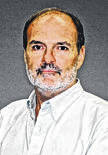
It was by no means intentional, but the first 500 days of the Trump presidency happened to coincide with my reading of three presidential biographies: Ron Chernow’s “Washington: A Life,” David McCullough’s “John Adams” and Jon Meacham’s “Thomas Jefferson: The Art of Power.”
These are extraordinary books about extraordinary men in extraordinary times. It would be quibbling and peevish to compare the current occupant of the White House to our first three presidents.
On the other hand, Trump hasn’t been shy about comparing himself to previous presidents. Last summer at a rally in Youngstown, Ohio, he told his enthusiastic audience, “With the exception of the late, great Abraham Lincoln, I can be more presidential than any president that’s ever held this office.”
Last week, relying on his well-worn “many-believe” trope, he said, “…we have accomplished a lot — many believe more than any president in his first 500 days.”
And he didn’t demur in February when he understood Sen. Orrin Hatch (R-Utah) to have said that Trump is “the greatest president in the history of our country.” “Does that include Lincoln and Washington?” Trump asked.
So, really, Trump is fair game for comparison to previous presidents. But comparing him negatively to presidents like Washington and Lincoln is as pointless and unproductive as the positive comparisons that Trump himself makes.
It’s worth remembering, however, that Trump is just a president; the presidency itself belongs to the nation, and it exists beyond the men, great and flawed, who have held the office.
The biographies of Washington, Adams and Jefferson remind us that the presidency had to be invented. The American colonies had been subject to oppressive monarchical rule and were naturally suspicious of investing too much power in one man. Washington and Adams favored a strong executive branch. Jefferson saw things a bit differently. The tension between these viewpoints laid the foundation for the presidency that emerged.
But these three men understood the momentous nature of what they were doing, and the humility with which they undertook the task is striking.
Washington was a reluctant president. Despite his essential role in the nation’s founding, including leading the revolutionary army to victory over the world’s most powerful military, he accepted the presidency with this modest disclaimer: “While I realize the arduous nature of the task which is conferred on me and feel my inability to perform it, I wish there may not be reason for regretting the choice. All I can promise is only that which can be accomplished by an honest zeal.”
Adams was a less reluctant president, but despite his vanity, he harbored his own doubts about his capacity for the task. His sense of humility is more complicated than Washington’s, but he once wrote: “I am but an ordinary man. The times alone have destined me to fame.”
And Jefferson began his inaugural address thus: “…the task is above my talents, and I approach it with the anxious and awful presentiments which the greatness of the charge and the weakness of my powers so justly inspire.”
After our first three presidents, all sorts of men have served in the office. Some were heroes and patriots. Some were liars, scoundrels, Indian killers and slave holders. Given the complex, flawed nature of humanity, these categories are not mutually exclusive.
But the best ones understood the gravity and complexity of the task before them and were awed by the office they presumed to fill. They understood that the presidency entails obligations as well as powers. And they understood that the powers inherent in the office belong, above all, to the people, and that the appropriate response to assuming the presidency should be humility rather than arrogance.
Trump, of course, isn’t the sort of man who reads biographies of past presidents. That’s too bad. If he did, he could learn a lot about not only what it means to be president, but what the presidency means.


